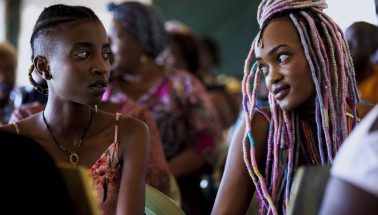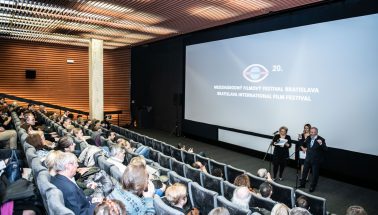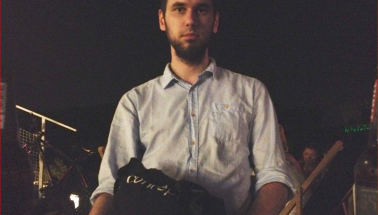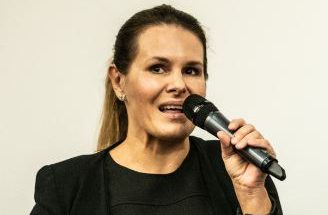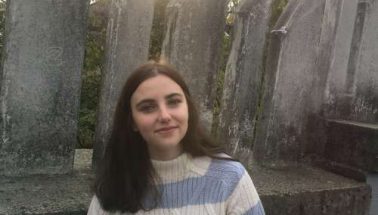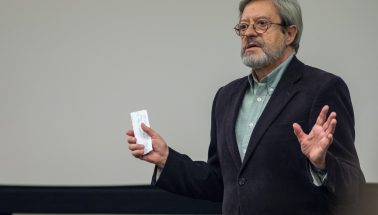Interview
While Hungarian director Szabolcs Hajdu is not unknown to Slovak cinemagoers, his latest picture, It’s Not the Time of My Life (Ernelláék Farkaséknál), has been a surprise in many ways, particularly in the context of his past. It was made on a €5,000 budget and the director made it in his own apartment with members of his own family. The film premiered last summer at the Karlovy Vary IFF where it claimed the main prize, the Crystal Globe, and Hajdu underlined its success by snatching the Best Actor award. Two weeks ago, Hajdu won a special prize for directing at the Cottbus IFF.
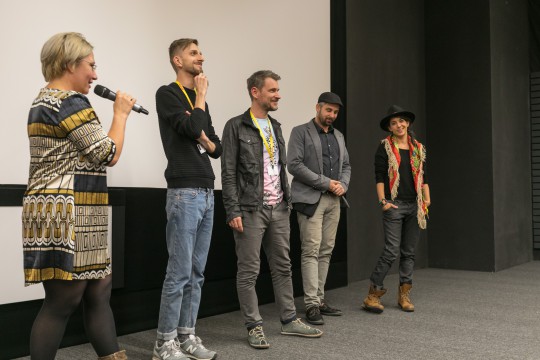
EK: Your film speaks of people who are related by blood and they love one another deep in their heart. Whatever happened to them that make them treat each other the way they do in their particular situation and what it has to do with the overall social, political and economic climate in your country?
SH: Politics always tends to affect people’s everyday lives; there’s just no way around it. It has an impact on the social atmosphere and it would be difficult to ignore it. Until certain point I tried to act like a tourist in Hungary, but unfortunately I understand the language and I hear people talking in the streets. Our friends come visit us and they tell us what happens to them; I bring the kids to school and back, so I also become part of the circulation. Then, when we decide to shoot a film like this, which takes place in our home, it naturally soaks in the social atmosphere that prevails in the country we live in, that is, if we treat the subject matter sensitively and honestly.
EK: So what is the social atmosphere that makes you feel It’s Not the Time of My Life?
SH: Let me express myself through a metaphor. Ever since I was a child, I imagined life as a big white blanket suspended on the washing line while people I respect are the pegs that hold the blanket in place. In recent years, I have a feeling that these pegs are gradually falling off one by one and that each fallen peg leaves a gap that makes the blanket drop lower and get crumpled a little. Naturally, there is a growing anxiety that one day the blanket falls completely off the washing line and into the dirt. This is the way I perceive the current situation in Hungary. Many of those “pegs” have ceased to be active – they died, got sick, became alcoholics, whatever – and there is nothing and nobody to take their place and support the blanket. The reference points have disappeared, making a man uncertain and neurotic. We are uncertain from every point of view. How can we raise our kids and nurture their respect for authorities or liberal values? Should we stay here or should we leave here? Nobody is able to tell us and nobody even bothers to analyse what makes sense and what doesn’t anymore. We are forced to figure it out by ourselves, which takes a lot of groping around in great uncertainty. While doing so, we have to live our everyday lives and make our little everyday decisions. And even though we are far from certain that they are the right ones, we have to keep making them or somebody else will make them for us. This is basically the mind-set our new film is about.
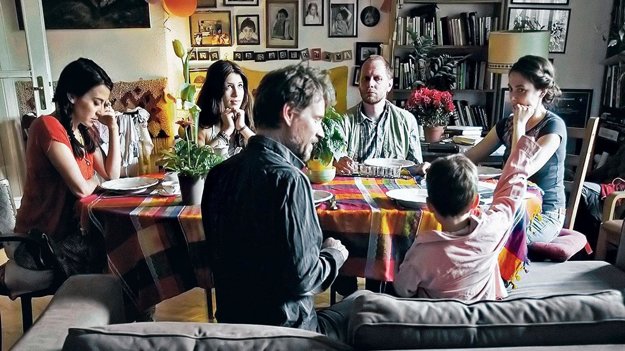
EK: On the one hand, your film is an adaptation of your own stage play; on the other hand, the fact that it takes place in your own apartment and features members of your own family makes it move away from fiction and toward documentary in a way. What made you choose this form?
SH: I wouldn’t say I used documentary means of expression; quite the contrary. Basically, my principal motivation was that I cannot control viewers’ attention in a theatre. They look wherever they feel like looking and if they decide to watch a single actor that caught their eye for the full 90 minutes, there’s nothing I can do about it. In a film, however, the audience must watch what I decide to show them. But I cannot show them everything because if I used every single line from the play in the film, it would look like a bad recording of a theatre show. Therefore, we must accentuate the dialogue much more precisely than in a theatre. A great deal of things happens out of the frame and remains hidden from the viewer. What is peculiar about the camerawork is that the camera always tends to be with somebody; it always dwells within the intimate space of some of the characters. It moves from one subject to another. That in itself is very un-documentary as documentaries usually strive for some sort of objectivity. We didn’t have an ambition at all to make any pan shots of the set; we decided to throw them out right at the start. We agreed that we would not compose shots but we would create relations. Had we chosen to compose shots, we would probably have shown everything in the apartment in 20 or 30 minutes and then it would have not been interesting anymore. But since we opted for creating relations and they tend to change constantly, we managed to carry on for another half an hour without boring the viewer. This way of storytelling is very exciting and I have found pleasure in experimenting with it for quite some time now.
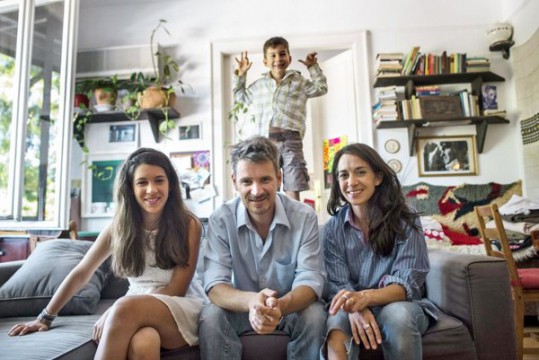
EK: On all your previous motion pictures, you collaborated with sublime cinematographer András Nagy who has created a well-coordinated tandem with you, something like Bergman-Nykvist or Forman-Ondříček, to remain in Central Europe. Why did you decide to replace him in your latest movie with 13 camerapersons who are mostly your cinematography students? Was it called for by the form of the film or was it rather about giving your students a particularly creative assignment?
SH: While we were shooting this film, everything was happening very organically as if it was inventing itself. By the time we decided to begin shooting this picture, I had been teaching my students for one year how to process a dialogue in an unconventional way so that they don’t get caught in creating the entire scene by cutting between the whole and two talking heads or by panning between two faces. We tried to understand the situation, understand mutual relations between the characters and express them through a camera. I demanded a sensitive approach from them, which is something we had discussed at exercises and exams. Just as we were completing this stage of schoolwork, I had finished a stage play at the theatre and I decided to shoot a film based on it. And since it was such a small film, we could afford to give the kids an opportunity to test what they had been studying at school. Another reason was that we didn’t have the money to pay a director of photography. No matter how good a friend of mine András Nagy may be, I just couldn’t ask him to work completely for free. Besides, it would take quite some time to explain what I needed from András as he would approach the film from a totally different perspective. These students had been trained in exactly what I needed from them. From every angle (i.e. the cast and the crew), the ball had been inflated just about right so that we could just play it. And last but not least, I couldn’t have picked just one of my students because that would not have been pedagogically correct. So, we split the takes and the students worked in teams of five, each featuring one cameraman. These teams took rotations, so it was good experience for them also in terms of mutual cooperation.
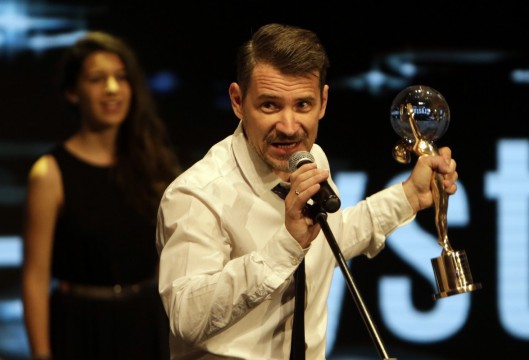
EK: You are a successful director as your films score big at prestigious film festivals and harvest critical acclaim. How come your latest picture did not receive any financial support from the government?
SH: The point is not that I didn’t receive any but that I didn’t ask for any. My very good friend, Buharov, coined a term “self-gulag” for this. I disagreed with the policies of our [Hungarian National] Film Fund. I have said it out loud many times and I wanted to be consistent. When we completed the movie, everybody advised us to register it with the official database of the Hungarian Film Union, which might send it to the Karlovy Vary film festival. But when people from the Union watched it, they said they wouldn’t send it to Karlovy Vary. For one, they said they didn’t like it and it was not even a film by their standards; for two, it had not been supported from the film fund. So we ended up sending the film to Karlovy Vary on our own bat. When they selected us to the competition, we ran into trouble because they required standard promotional materials such as trailer, poster, or press kit we didn’t have the money for. Eventually, we managed to produce some of that stuff on our own but we still operated very much like tourists at Karlovy Vary. We would wander around the town and go on hikes into surrounding hills. When we arrived at the festival, the official Hungarian delegation was just on their way back to Budapest. Until this day, It’s Not the Time of My Life is not listed in Hungary’s official film lists and catalogues. Fortunately, we don’t need it because after we won the main prize at Karlovy Vary, other festivals just keep inviting us. We are very happy about that, since we originally did not expect this film to make it to any festivals at all, let alone Karlovy Vary. At this moment, it seems that the picture will even make official distribution in Slovakia as it has been purchased by Aerofilms from the Czech Republic.
EK: Could you please explain why do you oppose the policies of the Hungarian National Film Fund?
SH: Because the Fund was established by an aggressive political decision and its entire modus operandi is very aggressive. Basically, what they did was they abolished the filmmaking community’s independence completely. Of course, there are still good films being produced that bring good results, but good films are made by the directors and not some film fund. Hungary has always produced good films; there was never any problem with that. But we only see those films they approved and not those they refused. I know many talented directors who have seen eight screenplays turned down. And this is no sustainable way of living for a filmmaker in the long run. In fact, at this point I am perhaps the only one in Hungary who works this way. We financed the entire film by ourselves and when I wanted to do the editing, I had to do eight-hour days of construction work and my wife Orsolya [who played the main female character] had to spend hers working in a perfume shop. Don’t get me wrong, I like physical labour and it even enriches me mentally, but it costs a lot of time I could otherwise invest into my films.
EK: Are you planning to make another picture already? And if so, will you apply for a grant from the Hungarian National Film Fund?
SH: Yes. As soon as I finish the stage plays that are currently in the making I intend to start making a new film. We have already put aside some funds from film festivals and we will seek foreign co-producers. I will not be asking for a grant from the Hungarian National Film Fund. Besides, we are again not looking for a costly production. I must say that having made relatively expensive films before has made me appreciate shooting smaller and cheaper films much more. The entire creative process works faster and more naturally. Whereas I always found myself dissatisfied with many things about my “big pictures”, I am absolutely happy with It’s Not the Time of My Life.
Eva Križková
(The interview was interpreted from Hungarian to Slovak by fellow director Mátyás Prikler. English translation: Daniel Borský)
EK: Plánuješ začať nakrúcať ďalší film? Budeš na neho žiadať dotáciu z Maďarského národného fondu?
SH: Áno. Po dokončení rozpracovaných divadelných predstavení sa pustím do nového filmu. Máme už nejaké úspory z festivalov a budeme hľadať zahraničných koproducentov. Maďarský fond o dotáciu nebudem žiadať. Okrem toho, opäť nepôjde o drahý film. Musím povedať, že po pomerne drahých filmoch, ktoré som už doteraz nakrútil som zistil, že malé a lacné filmy ma baví nakrúcať oveľa viac. Celý proces funguje rýchlejšie a prirodzenejšie. Kým na mojich veľkých filmoch mi nakoniec vždy veľa vecí prekážalo, s Rodinným šťastím som absolútne spokojný.
Eva Križková
(Z Maďarčiny tlmočil Mátyás Prikler)

